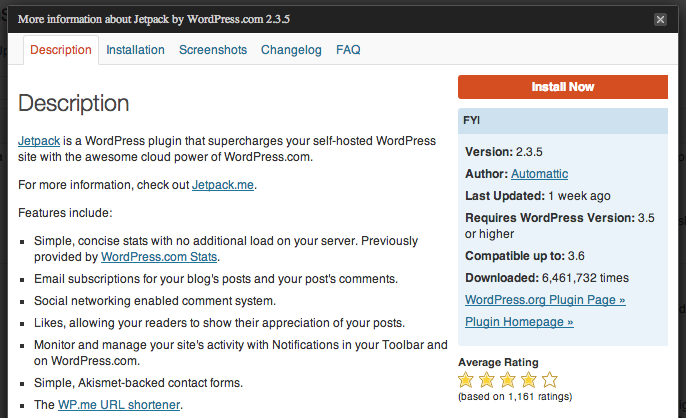Plugins are add-ons that extend wordpress so it can do almost anything. They are essentially bells & whistles that you add to your website to improve the front end {what your visitors see} or the backend {what you see}.
The default installation of WordPress comes with a few plugins already + the number typically grows from there. Since I’m betting money you have some installed on your WordPress website, here’s a little quiz for you to take…
How’d you do? If there’s room for improvement, no worries hot stuff, I’ve got your back.
Good plugins = Great website
Ok, so that equation is pretty simplified + general, but the fact is that plugins impact your website pretty drastically.
Security Risks
For starters, bad plugins can leave your site less secure than it was before you clicked “Install Now”. Poorly made plugins often have security holes or weaknesses that hackers can take advantage of. You certainly don’t want to lose your entire website just because you had to add a recent tweet box to your footer, right?
User Experience Issues
Aside from security, plugins also impact the overall user experience of your site. And I’m talking about the experience for both you + your site visitors. Bulky plugins can slow a site down, which is the #1 reason why people leave a website. If that isn’t enough to convince you, poorly designed plugins can frustrate your site visitors – giving them a bad vibe about your brand, causing them to skip giving you contact information, keeping them from doing more searching into your products or services, etc.
Incompatibility
Installing good plugins on your website also helps prevent the headaches that go along with incompatible plugins. Some of them do not get along with others or with your version of WordPress, which is an even bigger issue. The worst part is that you {or your developer} have to troubleshoot the problem + there is no warning box that will say “plugin x is not a fan of plugin y so you have to remove one in order for the other to work.” If I could develop that warning box… But seriously, your time is money, it shouldn’t be wasted on silly stuff like that.
What makes a plugin good?
There are lots of things to consider when picking a good plugin. But before you even go searching, spend a little time thinking about what it is you want to add to your site. Yes, this means you shouldn’t just add plugins because someone was raving about it in your favorite Facebook group. You should add plugins that improve on the existing features of your website, help you succeed in your business goals or improve your systems.
Learn From Others

Armed with your wishlist? Head to the plugin directory to search for what you need. Hopefully you’ll be presented with a list of many options that you can whittle down to the best one. Start by reading the descriptions to make sure the plugin will solve your problem/fits your criteria. Then you can sort the possible options by rating. Obviously people on the internet can be unnecessarily harsh, but the star rating system is often a good indicator of the quality of the plugin.
Updated + Compatible

With a list of a handful of options, it’s time to do a bit more digging. View the details for the plugin contenders so you can check out when the plugin was last updated. I confess, I’ve been known to install some older plugins because they were built well + solve a need. But, it’s in your best interest to find plugins that are regularly updated + current since they are more likely skip the security + compatibly issues that outdated plugins might have.
While scoping out the update details, see if the plugin is compatible with your version of WordPress. If an older version is listed, that doesn’t mean your site will crumble upon install, but there may be problems that you will have to deal with. {Since version 3.6 of WordPress was released this month, a large number of plugins won’t list that version – they are probably working on testing or updating right now.}
Good Support

At this point there should only be a couple contenders to pick from. This is when I typically check out the plugin page for each option to see what the support forum threads look like + the documentation that is available. Are there lots of [resolved] topics? Are the description, installation instructions + screenshots easy to follow? If so, I’m in.
The last factor that I keep in mind when choosing a plugin is if I get a direct recommendation from someone that I trust. I still research the plugin to make sure it’s what I need, but it helps me skip a lot of the sorting if I were starting from scratch.
Now What?
The best thing you can do is make sure your site has plugins that work + you don’t have multiple solutions to one problem installed. Once you have cleaned up your plugin area, start searching for better plugins to up your site’s security, speed + user experience. Who wouldn’t love improving on all three of those things?
